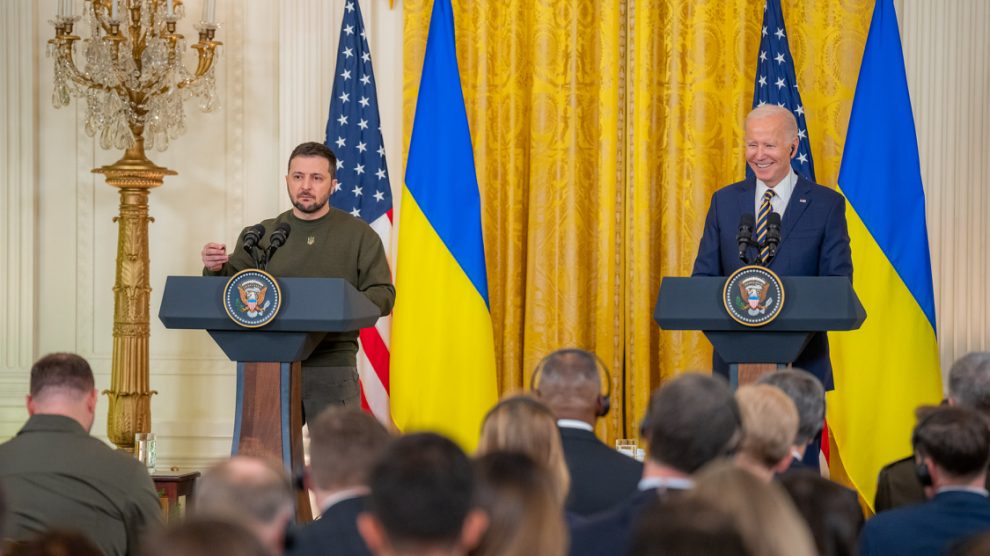Ukrainian President Volodymyr Zelensky was in Washington on December 21, his first foreign visit since Russia launched its full-scale invasion in February.
It could have been Warsaw, possibly London, Vilnius, Riga or Tallinn, but was never likely to be Berlin or Paris. And certainly not Budapest.
In the end, however, there was only one possible destination for Ukrainian President Volodymyr Zelensky’s first visit outside his country since it was invaded by Russia on February 24: Washington.
It was to the White House that Zelensky made his way on December 21, meeting with his US counterpart Joe Biden and addressing a joint session of Congress in a very public show of support for Kyiv’s cause.
- This Christmas, all Ukraine’s children want is peace
- Russia’s operation against Poland and NATO
- Freedom on Fire: A humanising chronicle of Ukraine’s struggle
As Ukraine’s most important ally, the US has already committed around 50 billion US dollars of humanitarian, financial and military assistance – far more than any other country. Biden pledged a new aid package of two billion US dollars and promised a further 45 billion US dollars next year, although that funding has yet to be approved by Congress.
There remains widespread bipartisan support on Capitol Hill for financially supporting Ukraine in its war against Russia, and the majority of Republicans have rallied behind the aid. Some Republicans, however, have warned they will not write a “blank cheque” for Ukraine. The party will take control of the House of Representatives in January.
In a pitch to any possible waverers, Zelensky told Congress that Ukraine was “alive and kicking” and would “never surrender”. The money from the US was not charity, but an “investment” in the future, he said.
“Our two nations are allies in this battle and next year will be a turning point. I know it. The point when Ukrainian courage and American resolve must guarantee the future of our common freedom. The freedom of people who stand for their values,” Zelensky told Congress.
“But we need to survive this winter,” he added. “We need to protect our people.”
The new package announced during Zelensky’s visit includes a new Patriot missile system, which is expected to help Ukraine protect its cities from missiles and drones that Russia has fired at critical infrastructure.
“In two days we will celebrate Christmas, by candlelight. Not because it’s more romantic, no, but because there will be no electricity,” said Zelensky, highlighting the damage to civilian infrastructure caused by Russia’s attacks.
Later, at a press conference, Biden said that the world should be clear about what Russia is doing.
“It is purposefully attacking Ukraine’s critical infrastructure, destroying the systems that provide heat and light to the Ukrainian people during the coldest, darkest part of the year. Russia is using winter as a weapon — freezing people, starving people, cutting them off from one another.”
However, Washington is still refusing to supply Ukraine with longer-range weapons that would be able to strike deep inside Russia. If that’s what Zelensky came to Washington for, he may have left disappointed.
“We have artillery,” he told Congress. “Is it enough? Honestly, not really. For the Russian army to completely pull out, more cannon and shells are needed.”
“I know that everything depends on us, on the Ukrainian armed forces. Yet so much depends on the world. So much in the world depends on you,” he told Congress. “Russia could stop its aggression, really, if it wanted to. But you can speed up our victory.”

Bakhmut holds
The previous day, Zelensky had been in the eastern Ukrainian town of Bakhmut, which has for months heroically withstood wave after wave of Russian attacks. Moscow has placed great importance on capturing the town and has lost tens of thousands of soldiers attempting to do so.
Earlier this week, some media in the Russian capital reported that Bakhmut had finally surrendered. Zelensky’s visit dealt a swift blow to such false news.
His visit to Washington – where he presented Congress with a battle flag signed by the defenders of Bakhmut – is likely to deal a similar blow to the idea that the US is growing tired of the war, and would prefer Zelensky to sue for what would be a painful peace.
Photo: White House official Facebook page.
Unlike many news and information platforms, Emerging Europe is free to read, and always will be. There is no paywall here. We are independent, not affiliated with nor representing any political party or business organisation. We want the very best for emerging Europe, nothing more, nothing less. Your support will help us continue to spread the word about this amazing region.
You can contribute here. Thank you.







Add Comment